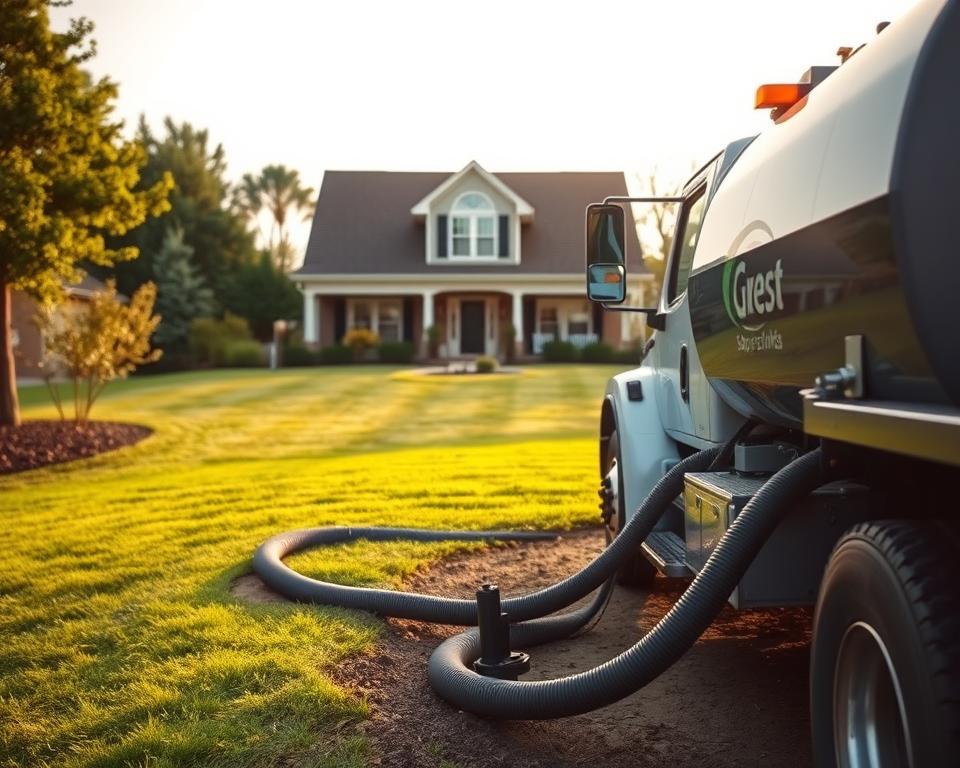Essential Tips for Septic System Pumping
Do you ever think about how often you should schedule septic system pumping to avert hefty failures? With over 20 percent of U.S. households relying on septic systems, understanding their maintenance is vital. Pinpointing the right time to book a septic tank service is paramount to its lifespan. In addition, there are economical septic pumping options that ensure top-notch functionality while staying on budget. We’ll explore essential upkeep recommendations useful for every homeowner.
Critical Findings
- Regular septic system pumping is vital for optimal functioning.
- Identifying the signs that signal the requirement for service can ward off major issues.
- Hiring professional septic system pumpers guarantees quality maintenance.
- Affordable septic pumping alternatives are available for homeowners.
- Periodic inspections promote optimal system performance.
Understanding Your Septic System
A septic system serves a vital role in handling household wastewater, made up of several essential components that function together. The initial drain line carries wastewater from your home to the septic tank, where the process begins. In the tank, an underground chamber, solids accumulate at the bottom, and bacteria digest these solids, cleaning the waste efficiently.
The processed liquid outflow subsequently flows from the septic tank to the distribution box, where it is dispersed evenly across the drain field or leach field. Here, the soil extends the filtration, further purify the wastewater. Comprehending the functions of these septic system parts is essential. It enables homeowners to monitor and maintain their systems effectively.
Being aware of how your septic system runs helps you implement proactive maintenance measures. It’s beneficial to have regular check-ins with professional technicians of septic systems – septic tank pumping. They supply crucial insights for best functioning of your system. These experts help in planning the required pump-outs and checks. This attentiveness can significantly prolong your septic system’s lifespan.
Importance of Septic System Maintenance
Keeping your septic tank consistently is key for homeowners who wish their system to endure. A well-cared-for system offers peace of mind and protects your property’s value. Without proper care, you’re facing system breakdowns and health dangers.
Selecting a first-rate septic pumping service is important. They deliver timely inspections and pump-outs, removing sludge and scum buildup. If maintenance is neglected, emergency pumping may be required, which is pricey.
Following a regular maintenance plan is smart. It entails professional evaluations and regular pumping. This proactive measure heads off urgent issues, creating a safer living environment for everyone.

Signs Your Septic System Needs Attention
Staying mindful of septic system issues can avoid budget-breaking repairs and major damage. Common signs signal when your system demands a check. These include:
- Slow drains throughout the house
- Pooling water in the yard above the drain field
- Foul odors near the septic tank or leach field
- Exceptionally green grass growth in certain areas of your yard
These signs could point to problems that might lead to your system failing. Prompt action is essential. Reaching out to septic pumping professionals for an inspection aids. Early intervention avoids minor issues from becoming major ones. Additionally, consistent upkeep secures your system operates well and lasts longer.
Best Practices for Septic System Pumping
Correct pumping of your septic tank is imperative to sidestep expensive clogs and backups. It’s necessary to find the appropriate interval for maintenance. Homeowners should generally schedule pumping every 2 to 5 years, based on the tank’s size and household wastewater levels. Frequent use of garbage disposals may require more frequent pumping.
Engaging professional pumpers means your tank gets a complete clean and check-up. During pumping, specialists look for any issues, such as broken baffles. Detecting these problems at an early stage prevents larger expenses and inconveniences later. Regular pumping schedules and expert help ensure your septic system’s trouble-free operation.
Regular Inspections Keep Your Septic System Running
Regular inspections are vital for your septic system’s efficiency. Septic system inspections reveal minor issues before they grow. Experts advise inspections every three to five years, depending on system size and household usage. This avoids expensive fixes.
Keeping maintenance records is vital for documenting your system’s condition. These records offer insights into previous inspections, repairs, and when to schedule septic tank cleaning services. With this information, organizing for future upkeep becomes simpler, retaining septic systems in prime shape.
Consistent inspections and detailed record-keeping not only enhance system efficiency but also lengthen its life. This strategy safeguards the environment and the investment in a safe, operational home.
| Inspection Type | Recommendation Frequency | Benefits |
|---|---|---|
| Visual Inspection | Annually | Identify surface issues |
| Professional Inspection | Every 3–5 years | Assess functionality and detect problems |
| Septic Tank Pumping | Every 3–6 years | Prevent overflow and system failure |
Using Water Wisely to Improve Septic Longevity
Mindful water use is crucial for keeping your septic system healthy. It not only helps the environment but also improves the performance of your home’s plumbing. By practicing straightforward, yet effective, conservation methods, homeowners can decrease wastewater.
Stagger your laundry activities over the week instead of running back-to-back loads. This enables the septic system to process water better and prevents tank overflow. Installing low-flow fixtures in your kitchens and bathrooms produces considerable water savings, keeping the water pressure up while cutting the flow rate, thus lowering the amount of wastewater produced each day.
Quickly fixing leaks is another way to support your septic system. Even a small leak can result in a large waste of water, overburdening the septic system. Through periodic inspections and repairs, you greatly aid the system’s efficiency.
Focusing on water conservation isn’t just advantageous for your septic system; it’s also a step towards sustainable living. Integrating such practices a part of your lifestyle serves both your household and the planet.
Best Practices for Household Waste Disposal
Homeowners carry a key role in keeping their septic system’s health by handling household waste appropriately. It’s critical to avoid flushing non-biodegradable items like wipes, plastics, and other hazardous products in the system. These items can create clogs, leading to costly repairs and a drop in efficiency.
Recycling food scraps and organic materials is a beneficial alternative to sending them to landfill. This practice greatly reduces the amount of solid waste entering the septic tank. Prioritizing biodegradable waste disposal supports the ecological balance needed for effective waste management.
It’s essential to watch what goes down the drains. Non-decomposable items can requiredemand more frequent septic tank pumping. By grasping and following correct waste disposal methods, you can guarantee a more efficient and long-lasting septic system.
Choosing Septic-Friendly Cleaners
The health of your septic system is heavily influenced by your choice of cleaning products. Opting for septic-safe cleaning products is crucial. These products safeguard the balance of beneficial bacteria that decompose waste. Many standard cleaners include harmful chemicals that jeopardize this balance, causing expensive repairs or system failure.
Homeowners should try natural alternatives that are both efficient and environmentally friendly. Common household items like baking soda, vinegar, and lemon juice are excellent choices. These natural cleaners are not only effective but also maintain your septic system’s health.
Steering clear of products that contain antibacterial agents and chlorine bleach is crucial. Such substances destroy the essential good bacteria, compromising your system’s functionality. By picking sustainable products, you ensure both the efficiency and longevity of your septic system.
The Role of Bacteria in Your Septic System
Bacteria play a critical role in keeping your septic system functional. They break down solids naturally and boost nutrient processing. A lack of healthy bacteria can cause system failure, creating costly repairs.
Homeowners can improve their system by introducing organic additives. These products raise beneficial bacteria, making waste decomposition more effective. It’s important to opt for organic additives that are beneficial, not harmful, to the septic environment.
A robust bacterial community is crucial to a septic system’s longevity and efficiency. It prevents solid buildup and cuts the need for repeated pumping. Prioritizing bacterial health makes waste management more effective and eco-friendly.
Final Reflections
Septic system care is vital for the longevity and functionality of your home’s wastewater system. Sticking with key maintenance tips sidesteps expensive repairs. Understanding routine pumping and inspections is paramount. This guarantees your septic system remains in peak condition.
Learning about your septic system’s operation and smart approaches in water and waste management is crucial. Engaging professionals like All in Sanitation delivers expertise. This contributes to your septic system’s long-term health and gives peace of mind.
Prioritizing proper septic maintenance today yields future benefits. It safeguards your home and boosts your family’s quality of life. Focusing on septic system care gives assurance with a well-maintained system.


